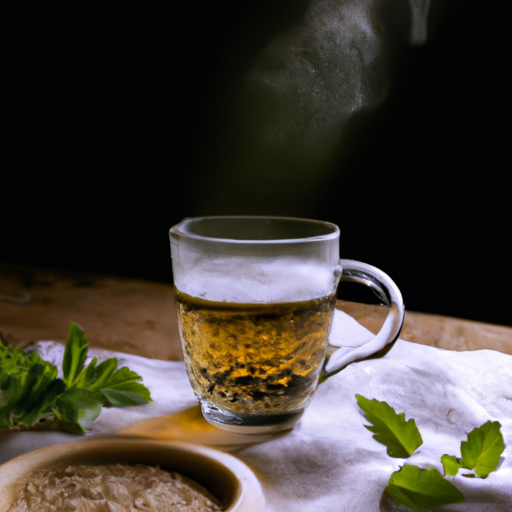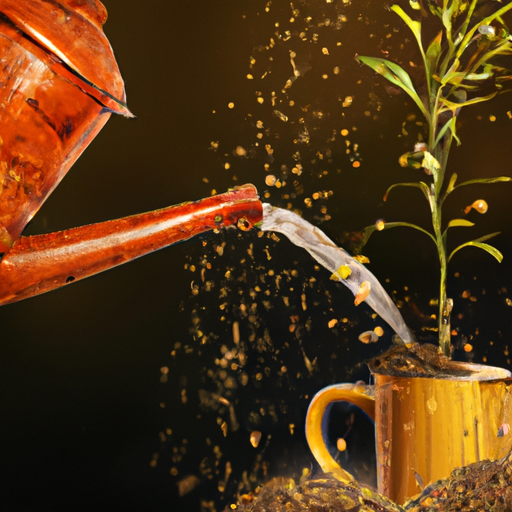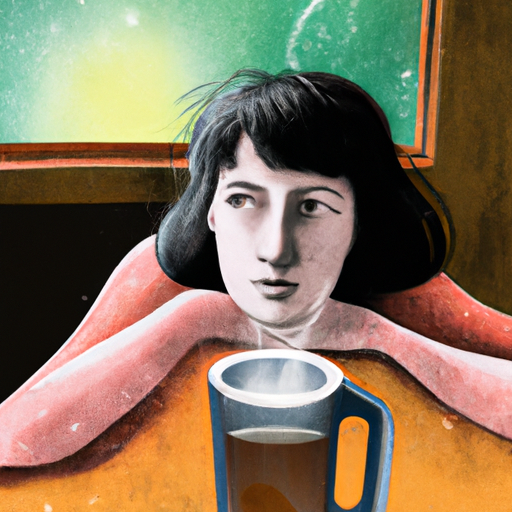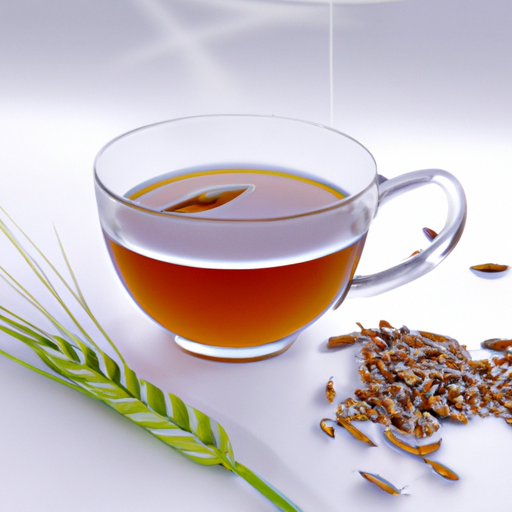Ah, barley tea. That beverage that connects me to nature while quenching my thirst on a scorching summer day. Ever pondered what ingredients make up this deceptively simple drink? Fear not, my friend, for I have conducted the research on your behalf.
First things first, let’s establish what barley tea actually is. It’s a caffeine-free herbal tea made from roasted barley grains and water. That’s it! Simple enough, right?
But don’t be fooled by its simplicity – there are actually quite a few health benefits to drinking barley tea. So let’s dive in and explore what makes up this delicious and nutritious drink.
Key Takeaways
- Barley tea is a caffeine-free herbal tea made from roasted barley grains and water.
- Barley tea is rich in antioxidants and minerals such as calcium, magnesium, phosphorus, potassium, zinc, iron, and selenium.
- Barley tea can help boost bone health, improve digestion, and regulate blood pressure, and is low in calories, making it an excellent choice for weight management.
- Barley tea can be made using loose barley grains or pre-packaged tea bags, and can be flavored with other ingredients such as chrysanthemum flowers or goji berries.
What is Barley Tea?
Barley tea, also known as mugicha, is a refreshing and caffeine-free beverage that’s popular in East Asia. It’s made from roasted barley grains that are boiled in water, then strained and served either hot or cold. The tea has a nutty flavor with a hint of sweetness, making it the perfect drink to quench your thirst on a hot summer day.
The origins of barley tea can be traced back to ancient China, where it was used for its medicinal properties. Over time, it became an important part of Japanese culture and is often served during meals or as a refreshment at social gatherings. In Korea, barley tea is considered to be a traditional summertime drink that helps cool the body down.
Despite its cultural significance, barley tea is simple to make and requires only two ingredients: roasted barley grains and water. However, there are variations of the tea that include additional ingredients such as corn silk or dried fruit peels. These additions can enhance the flavor profile of the tea while also providing additional health benefits.
Moving on to the next section about the ingredients in barley tea, let’s take a closer look at what makes this drink so healthy and delicious.
The Ingredients in Barley Tea
You’ll be delighted to find a rich medley of toasted, nutty flavors in every sip of this cozy elixir – the perfect blend of roasted grains and water.
Barley tea is made from the roasted grains of barley, which gives it its unique taste and aroma. The brewing process involves steeping the barley grains in hot water for a few minutes until the desired strength is achieved.
Barley tea nutrition is also worth noting. It contains no caffeine or calories, making it a healthy alternative to other beverages. It also has high levels of antioxidants and minerals such as magnesium, potassium, and calcium. These nutrients help to support bone health, improve digestion and regulate blood pressure.
When it comes to brewing techniques, there are various ways to make barley tea depending on personal preference. Some people prefer to use loose barley grains while others use pre-packaged tea bags for convenience. Regardless of the method used, taking time to brew your own cup of barley tea will be worth it as you can enjoy all its nutritional benefits while savoring its unique taste and aroma.
Moving forward into discussing the health benefits of barley tea, you’ll discover how this simple beverage can do wonders for your body’s overall well-being.
Health Benefits of Barley Tea
Indulging in a warm cup of barley tea can help boost bone health, improve digestion, and regulate blood pressure while providing essential antioxidants and minerals. Barley tea contains several nutritional properties that contribute to its health benefits. It’s low in calories, making it an excellent choice for weight management. It also contains fiber, which aids in digestion and can promote satiety.
Additionally, barley tea is rich in antioxidants such as phenolic compounds and flavonoids. These antioxidants have been shown to reduce inflammation and protect against chronic diseases such as cancer and heart disease. The minerals present in barley tea include calcium, magnesium, phosphorus, potassium, zinc, iron, and selenium.
To emphasize the nutritional properties of barley tea further, here is a table showcasing its mineral content:
| Mineral | Amount per 100g |
|---|---|
| Calcium | 11mg |
| Magnesium | 20mg |
| Phosphorus | 44mg |
| Potassium | 50mg |
Incorporating barley tea into your diet can provide numerous health benefits. In the next section about how to make barley tea, I will share with you my favorite recipe for this delicious drink.
How to Make Barley Tea
Get ready to enjoy a refreshing and healthy beverage with this simple recipe for making your own barley tea at home. Barley tea is easy to make and requires only two ingredients: barley grains and water.
The first step is to rinse the barley grains under running water to remove any dirt or debris. After rinsing the barley, place it in a pot with 8 cups of water and bring it to a boil. Once boiling, lower the heat and let it simmer for around 20 minutes. This allows the flavors of the barley grains to infuse into the water.
After that, turn off the heat and let it steep for another 10-15 minutes. Recommended steeping time varies depending on personal preference but generally ranges from 5-15 minutes. Strain out the barley grains using a fine mesh sieve or cheesecloth before serving hot or chilled.
With this simple recipe, you can enjoy homemade barley tea anytime! Now that you know how easy it is to make your own, let’s explore different variations of barley tea without losing its health benefits and delicious taste.
Different Variations of Barley Tea
There are various ways to switch up the flavor of this wholesome beverage and still reap its health benefits, so let’s explore some tasty twists on this classic drink. Flavor preferences play a significant role in how we enjoy our drinks. With barley tea, it is no different. Some people prefer their barley tea plain, while others like to add sweeteners such as honey or sugar. For those who want a more complex taste profile, adding fruits like lemons or oranges can impart a zesty kick.
Brewing techniques also affect the taste of barley tea. The strength of the brew depends on how long you steep your grains and whether you use hot or cold water. Some people prefer their tea strong and robust, while others opt for a lighter brew that’s easier on the palate. Experimenting with different brewing techniques is an excellent way to find your perfect cup of barley tea.
There are numerous variations of barley tea that cater to individual flavor preferences and brewing techniques. Whether you like it plain or with added flavors, experimenting with different recipes can help you discover new ways to enjoy this healthy beverage. In the next section, we will explore traditional uses of barley tea in various cultures around the world.
Traditional Uses of Barley Tea
If you’re curious about the cultural significance of this ancient beverage, let’s explore some traditional uses from around the world.
Barley tea has been used for centuries as a natural diuretic, helping to flush out excess fluids and toxins from the body. Its detoxifying properties have made it a popular choice in many cultures, where it is consumed regularly as part of a healthy diet.
In Japan, barley tea is commonly served as a refreshing drink during meals, and is often given to guests as a sign of hospitality. It’s also believed to help reduce stress and promote relaxation, making it an ideal drink before bedtime.
In Korea, barley tea is known for its cooling properties and is often consumed during hot summers to help combat dehydration.
Barley tea has also been used in Chinese medicine for its detoxification purposes. It’s believed that drinking barley tea can help remove toxins from the liver and kidneys, promoting overall health and well-being.
With its numerous health benefits and refreshing taste, it’s no wonder that barley tea has become such an important part of many different cultures around the world.
Moving on to the next section about ‘barley tea in different cultures’, we’ll explore how this versatile beverage varies across different regions and traditions.
Barley Tea in Different Cultures
Across various cultures, barley tea has taken on unique flavors and traditions. In Korea, the tea is known as ‘boricha’ and is a staple drink during summertime. The tea is brewed from roasted barley grains and served both hot and cold. It is believed to have cooling properties that help combat the heat of the season.
In Japan, the tea is called ‘mugicha’ and is often served chilled in summer months as well. Unlike in Korea, Japanese mugicha can also be made with unroasted barley or a combination of roasted and unroasted grains.
Barley tea also holds cultural significance in China where it is commonly consumed for its medicinal properties. Known as ‘damaicha,’ it has been used to treat ailments such as stomach issues, fever, and fatigue. The Chinese version of barley tea may include additional ingredients such as chrysanthemum flowers or goji berries for added health benefits.
Regional variations in barley tea continue beyond Asia into Europe where it’s known as ‘hordeum vulgare.’ In Spain, hordeum vulgare is used to make a popular coffee alternative called ‘café de cebada.’ The drink consists of ground toasted barley mixed with boiling water which creates a bitter taste similar to coffee without caffeine.
Overall, the diverse cultural significances and regional variations of barley tea speak to its versatility as a beverage that transcends borders. However, despite its many benefits, there are still possible side effects to be aware of when consuming this beverage regularly.
Possible Side Effects of Barley Tea
You may want to be cautious about overindulging in barley tea as it can have some potential drawbacks. While generally considered safe, there are some possible side effects associated with this popular drink. In particular, those with digestive issues or caffeine sensitivity may want to exercise caution when drinking barley tea.
Digestive issues are one potential side effect of consuming too much barley tea. The high fiber content of the tea can cause bloating, gas, and other gastrointestinal discomfort if consumed in large quantities. This is especially true for individuals who already struggle with digestive issues such as irritable bowel syndrome (IBS) or inflammatory bowel disease (IBD).
In addition to digestive issues, caffeine sensitivity is another concern for those considering drinking barley tea. While not as high in caffeine as coffee or black tea, barley tea still contains a moderate amount of the stimulant. As such, those who are particularly sensitive to caffeine may experience jitters or difficulty sleeping after consuming too much of this drink. It’s important for individuals to know their own tolerance levels and consume barley tea accordingly to avoid any unwanted side effects.
| Possible Side Effects |
|---|
| Digestive Issues |
| Caffeine Sensitivity |
Overall, while there are some potential drawbacks associated with drinking barley tea, these risks are relatively low compared to many other drinks on the market today. However, it’s important for individuals to be aware of these possible side effects and exercise caution when consuming this popular beverage. By doing so, they can enjoy all the benefits that barley tea has to offer without experiencing any unwanted consequences along the way.
Frequently Asked Questions
Can barley tea be used as a substitute for coffee?
As someone who’s tried both barley tea and coffee, I can say that while they have some similarities, they’re not interchangeable.
Barley tea is a great alternative to coffee for those looking to cut back on caffeine or who want a warmer beverage without the jitters. Unlike coffee, barley tea is naturally caffeine-free and has been enjoyed for centuries in East Asian cultures for its soothing properties.
In addition to being a comforting drink, barley tea also has potential health benefits such as aiding digestion and reducing inflammation. However, if you’re looking for the energy boost that comes with caffeine, coffee is still the way to go.
At the end of the day, it really comes down to personal preference and what your body needs at any given moment.
Is it safe for pregnant women to consume barley tea?
As a pregnant woman, I was curious about the safety of consuming barley tea during my pregnancy. After doing some research, I found that while barley tea does contain caffeine, it’s significantly lower than coffee or black tea.
Additionally, drinking barley tea can actually be beneficial for hydration during pregnancy as it contains minerals such as potassium and magnesium. However, it’s still important to consume in moderation and consult with a healthcare provider before making any changes to your diet during pregnancy.
Overall, I feel confident in enjoying a cup of barley tea every now and then knowing that it can provide some health benefits without posing any major risks to me or my baby.
Does drinking barley tea have any impact on blood sugar levels?
Drinking barley tea may have a positive impact on insulin resistance and glycemic control. Studies have shown that the consumption of barley tea can help regulate blood sugar levels, potentially reducing the risk of developing type 2 diabetes. The active compounds in barley, such as beta-glucans and polyphenols, are believed to be responsible for these effects.
However, it’s important to note that more research is needed to fully understand the extent of these benefits and how they may vary depending on individual factors such as age and health status. Overall, incorporating barley tea into a balanced diet may be a beneficial choice for those looking to support healthy blood sugar levels.
Does barley tea have any known interactions with medications?
Hold onto your hats, folks, because when it comes to medication interactions with barley tea, there are a few precautions to keep in mind.
First and foremost, it’s important to note that while barley tea is generally considered safe and healthy for most people, there are some medications that could be impacted by its consumption.
For example, if you’re taking lithium or certain antibiotics like ciprofloxacin or norfloxacin, drinking barley tea could potentially decrease their effectiveness.
Additionally, individuals who take blood thinners should exercise caution as barley tea may increase the risk of bleeding.
As with any supplement or dietary change, it’s always wise to consult with a healthcare provider before incorporating barley tea into your routine.
Can barley tea help with weight loss?
Barley tea is known for its numerous health benefits, including aiding in weight loss. One of the main reasons why barley tea is effective in promoting weight loss is because it contains high levels of fiber, which helps to keep you feeling full and satisfied for longer periods of time.
Additionally, drinking barley tea can help regulate blood sugar levels and reduce cravings for sugary snacks and other unhealthy foods. To maximize the weight-loss benefits of barley tea, it’s important to incorporate it into a healthy diet and exercise routine that includes plenty of whole grains, lean protein sources, fruits, and vegetables, and regular physical activity.
Overall, incorporating barley tea into your daily routine can be an effective way to achieve your weight loss goals while improving your overall health and well-being.
Conclusion
In conclusion, I’m excited to incorporate barley tea into my daily routine after researching its ingredients and health benefits. It’s a natural and healthy alternative to sugary drinks or caffeine-packed beverages.
Barley tea has been used for centuries in different cultures, which further solidifies its effectiveness as a remedy for various ailments. Coincidentally, my grandmother recently praised the benefits of barley tea, sharing stories of how her mother brewed it every day to alleviate digestive issues.
It’s heartwarming to see that this traditional practice has stood the test of time and is still relevant today. Overall, incorporating barley tea into our daily lives can have numerous health benefits while also connecting us to cultural traditions.










